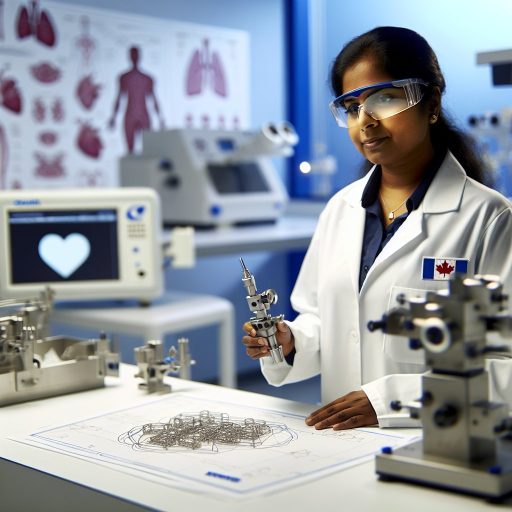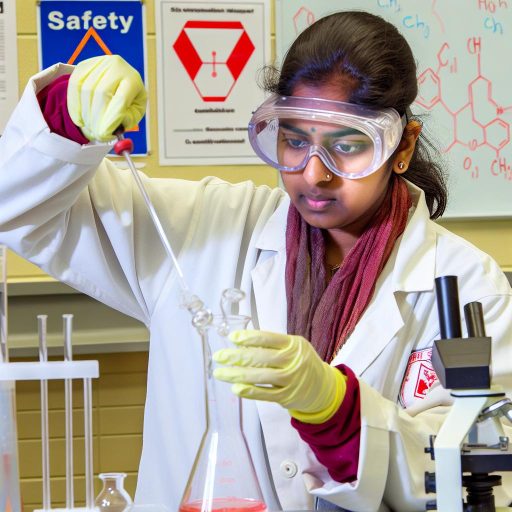Understanding the Role of a Chemical Engineer
Core Responsibilities
A chemical engineer designs chemical processes for large-scale manufacturing.
They develop efficient systems to convert raw materials into valuable products.
Additionally, they work on enhancing existing production processes.
Problem-solving skills are essential in their daily tasks.
They also ensure compliance with safety and environmental regulations.
Required Skills and Knowledge
A strong foundation in chemistry and physics is crucial for chemical engineers.
They need to be proficient in process design and optimization.
Analytical thinking is important for troubleshooting complex problems.
Furthermore, teamwork and communication skills are vital for project success.
Career Opportunities
Chemical engineers can work in various industries, including pharmaceuticals and energy.
Many find positions in manufacturing, environmental protection, and consulting.
Research and development roles also offer exciting career paths.
Additionally, management positions can be pursued with experience and education.
Importance in Society
Chemical engineers play a significant role in developing new materials and technologies.
They contribute to sustainable practices and renewable energy solutions.
Moreover, their work helps improve public health and safety.
Ultimately, they drive innovation within the chemical industry.
Researching the Company and Its Projects
Understanding the Company’s Mission
Each company has a unique mission and vision statement.
Begin by visiting the company’s official website for insights.
Look for information on their core values and objectives.
Understanding this can help you align your goals with theirs.
Exploring Current and Past Projects
Research the latest projects undertaken by the company.
Identify significant achievements and ongoing initiatives.
This information shows your genuine interest during the interview.
Consider highlighting specific projects that excite you.
Unlock Your Career Potential
Visualize a clear path to success with our tailored Career Consulting service. Personalized insights in just 1-3 days.
Get StartedInvestigating the Company Culture
Company culture plays a vital role in employee satisfaction.
Look for employee reviews on platforms like Glassdoor.
Pay attention to comments about teamwork and work-life balance.
You might also explore the company’s social media pages.
Identifying Key Competitors
Understanding the competitive landscape is crucial.
Investigate who the main competitors are in the industry.
Compare their strengths and weaknesses with the company you are interviewing with.
This knowledge can create a more informed discussion.
Connecting with Current Employees
If possible, reach out to current employees on LinkedIn.
Ask about their experiences and insights regarding the company.
They may offer valuable tips for your interview preparation.
Building a connection can also demonstrate your proactiveness.
Preparing Relevant Questions
Your research should help you prepare thoughtful questions.
These questions can address company culture, projects, or future goals.
Asking specific questions shows your interest and engagement.
Ask about challenges faced by the company in recent projects.
Preparing for Common Chemical Engineering Interview Questions
Familiarizing Yourself with Core Concepts
Start by reviewing fundamental concepts in chemical engineering.
This includes thermodynamics, fluid mechanics, and reaction engineering.
Additionally, understand the principles behind mass and energy balances.
Consequently, you will feel more confident during technical discussions.
Researching Industry Trends
Stay updated on the latest trends in chemical engineering.
Look into advancements in sustainable practices and technology.
This knowledge allows you to engage meaningfully in conversations with interviewers.
Furthermore, it demonstrates your commitment to the field.
Practicing Common Interview Questions
Anticipate common interview questions you may encounter.
Consider questions about your educational background and experience.
Practice behavioral questions such as problem-solving scenarios.
Moreover, prepare for technical questions related to specific processes.
Engaging in Mock Interviews
Participate in mock interviews with peers or mentors.
Such practice helps alleviate anxiety and improves your responses.
Additionally, simulate different interview scenarios for diversity.
You can request feedback to refine your answers and presentation skills.
Understanding the Company
Conduct thorough research on the target company before the interview.
Learn about its values, projects, and recent developments.
Tailoring your answers to align with the company’s mission impresses interviewers.
Hence, it shows you are a good fit for their organizational culture.
Preparing Your Questions
Prepare thoughtful questions to ask at the end of the interview.
Focus on topics like career growth, project involvement, and team dynamics.
Asking insightful questions demonstrates your genuine interest.
Additionally, it engages the interviewer in a two-way conversation.
Find Out More: Exploring Robotics as a Mechatronics Engineer in Canada
Demonstrating Technical Knowledge and Problem-Solving Skills
Understanding Core Concepts
Strong technical knowledge is vital for success in chemical engineering interviews.
Focus on fundamental principles such as thermodynamics, fluid dynamics, and kinetics.
Review the details of processes relevant to the specific industry you are applying to.
Employ a structured approach when discussing technical concepts during the interview.
Use clear examples to illustrate your understanding of key principles.
Showcasing Practical Experience
Your practical experience can set you apart from other candidates.
Discuss relevant internships or projects you completed during your studies.
Be prepared to explain your role and the impact of your contributions.
Highlight any technical software you utilized, such as Aspen Plus or MATLAB.
Illustrate problem-solving scenarios that arose during these experiences.
Solving Problem-Solving Scenarios
Employ effective problem-solving skills during technical interviews.
Interviewers often present hypothetical scenarios requiring analytical thinking.
Demonstrate your thought process clearly and methodically.
Explain how you identify the problem and the steps you take to reach a solution.
Practice common chemical engineering problems to enhance your readiness.
Communicating Complex Ideas
Effective communication is crucial in conveying technical knowledge.
Practice explaining complex ideas in simple terms.
Use diagrams or sketches if appropriate, as visual aids can enhance understanding.
Ensure you maintain eye contact and engage actively with the interviewer.
Ask questions that encourage discussion and show your interest.
Preparing for Behavioral Questions
Behavioral questions are common in interviews, so prepare accordingly.
Employ the STAR technique: Situation, Task, Action, Result.
Reflect on past experiences that showcase your problem-solving abilities.
Demonstrate teamwork and leadership in challenging circumstances.
Be honest and authentic in your responses, as interviewers value sincerity.
Gain More Insights: Education Requirements for Biomedical Engineers
Highlighting Relevant Experience and Projects
Understanding the Importance of Experience
Your experience is a vital part of your interview process.
It showcases your ability to apply engineering principles in real-world situations.
Moreover, relevant experience makes you a more attractive candidate.
Employers want to see how your past roles prepare you for their challenges.
Choosing the Right Projects to Highlight
Select projects that demonstrate key skills for the position.
Focus on projects where you made a significant impact.
Highlight your role in team collaborations and problem-solving.
Additionally, tailor your project selections to the specific job.
For example, mention a process optimization project when applying for process engineering roles.
Structuring Your Experience for Impact
Use the STAR method to communicate your experiences effectively.
Start with the Situation to set the context.
Then, describe the Task at hand clearly.
Next, explain the Actions you took to address the challenge.
Finally, discuss the Results that followed your actions.
Engaging Storytelling Techniques
Engage interviewers by crafting a story around your projects.
Use descriptive language to convey the challenges you faced.
Make your narrative compelling by expressing your enthusiasm.
Further, connect your experiences to the company’s core values.
This helps interviewers see your potential fit within their team.
Utilizing Metrics to Showcase Success
Quantifiable results enhance the credibility of your claims.
Use metrics to illustrate improvements achieved in your projects.
For instance, mention percentage increases in efficiency or production.
Furthermore, you can include cost savings linked to your contributions.
Preparing for Specific Industry Questions
Research common questions relevant to chemical engineering interviews.
Prepare to discuss regulations, safety standards, and process design.
Additionally, anticipate questions about your familiarity with industry software.
This preparation demonstrates your commitment and knowledge of the field.
Practicing Communication Skills
Clear communication is essential during interviews.
Practice articulating your experiences in a concise manner.
Role-playing with a friend can help identify areas for improvement.
Moreover, strong communication skills foster effective team collaboration.
Lastly, remain confident and articulate to leave a positive impression.
Discover More: Tips for New Graduates in Chemical Engineering

Practicing Behavioral Interview Techniques
Understanding Behavioral Interviews
Behavioral interviews focus on how candidates handled past situations.
They assess both skills and behaviors relevant to the job role.
Employers believe past behavior predicts future performance.
Knowing this can help you prepare effectively.
Researching Common Questions
Start by researching common behavioral interview questions.
Examples include “Tell me about a time you faced a challenge.”
Other questions may involve teamwork, leadership, and problem-solving.
Identify key skills required for the chemical engineering role.
Focus your preparation around those critical skills.
Using the STAR Method
The STAR method helps structure your responses clearly.
STAR stands for Situation, Task, Action, and Result.
Begin by describing the situation you faced.
Then, explain the task you needed to accomplish.
Next, discuss the actions you took to address the situation.
Finally, highlight the results of your actions.
This method allows you to communicate effectively.
Practicing with Mock Interviews
Conduct mock interviews with peers or mentors.
This provides a safe space to practice your answers.
Ask for constructive feedback after each session.
Refine your responses based on the input you receive.
Repetition builds confidence for the actual interview.
Analyzing Your Experiences
Reflect on your past projects and experiences.
Identify key moments that demonstrate your skills.
Consider academic projects, internships, or team efforts.
Make a list of relevant experiences to discuss.
This preparation allows for natural responses during the interview.
Preparing for Follow-Up Questions
Be ready for follow-up questions after your responses.
Interviewers often seek more details about your experiences.
Practice expanding on your STAR responses.
This showcases your depth of understanding and reflection.
Preparation aids in measuring your confidence and clarity.
Find Out More: Tips for Chemical Engineers Navigating Job Markets
Preparing Questions to Ask the Interviewer
Importance of Asking Questions
Asking questions shows your interest in the role.
Employers appreciate candidates who are engaged.
Moreover, your questions can clarify important details.
Types of Questions to Consider
Focus on questions about the company culture.
Inquire about the team you will be working with.
Ask about the challenges the team currently faces.
Consider questions regarding career development opportunities.
Additionally, you might want to explore the company’s future goals.
Specific Questions to Ask
- What does success look like for this position?
- How does this role contribute to overarching company goals?
- Can you describe a typical day for someone in this role?
- What are the immediate challenges facing the team?
- What opportunities exist for professional development?
Tailoring Your Questions
Customize your questions to reflect specific interests.
Research the company and its projects beforehand.
Additionally, consider the position’s requirements.
Your questions should reflect genuine curiosity and insight.
Avoiding Common Pitfalls
Avoid asking questions that are easily answered online.
Stay away from questions about salary early in the conversation.
Lastly, do not derail the interview flow with unrelated topics.
Final Preparation
Practice your questions with a friend or mentor.
Ensure you sound confident and comfortable while asking.
Finally, review the job description right before the interview.
Following Up After the Interview
Importance of a Follow-Up
Following up after an interview can set you apart from other candidates.
This gesture demonstrates your interest in the position.
Moreover, it showcases your professionalism and dedication.
When to Send a Follow-Up
Send your follow-up email within 24 to 48 hours after the interview.
This timing keeps you fresh in the interviewer’s mind.
However, ensure that you allow enough time for them to gather their thoughts.
Writing the Follow-Up Email
Your follow-up email should be concise and focused.
Start by thanking the interviewer for their time.
Then, express your enthusiasm for the role and the company.
Additionally, reiterate key points discussed during the interview.
Use this opportunity to address any unanswered questions.
Sample Follow-Up Template
Here’s a template to help you craft your follow-up email:
- Subject Line: Thank You – [Your Name]
- Greeting: Dear [Interviewer’s Name],
- Opening: Thank you for the opportunity to interview for the [Job Title] position.
- Body: I enjoyed our conversation about [specific topic discussed].
- Closing: I look forward to the possibility of joining [Company Name].
- Signature: Best regards, [Your Name]
Final Touches
Before sending, proofread your email for any mistakes.
This step ensures a polished and professional presentation.
Finally, personalize the email to reflect your interview experience.
Checking In After a Response
If the recruiter responds with an update, acknowledge it promptly.
Express gratitude for their time and consideration.
This approach fosters positive communication moving forward.
Additional Resources
to those who graduated w/ a bachelor’s degree in chemistry, was it …
Is data science oversaturated now? | Job Market : r/datascience




